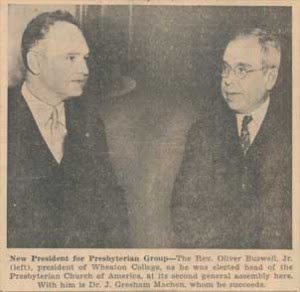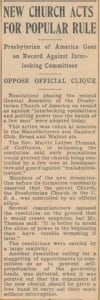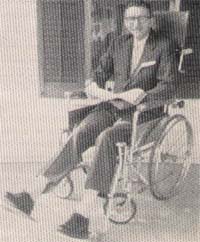 The Rev. Bill Iverson called today, in need of a document, and somewhere in our conversation the name of Bill Hill came up. The Rev. William E. Hill, Jr. is particularly remembered as a faithful pastor, as the founder of the Presbyterian Evangelistic Fellowship, and as a leading voice in the formation of the Presbyterian Church in America. The following article was written by Rev. Hill and published in THE PRESBYTERIAN JOURNAL about three years after the formation of the PCA.
The Rev. Bill Iverson called today, in need of a document, and somewhere in our conversation the name of Bill Hill came up. The Rev. William E. Hill, Jr. is particularly remembered as a faithful pastor, as the founder of the Presbyterian Evangelistic Fellowship, and as a leading voice in the formation of the Presbyterian Church in America. The following article was written by Rev. Hill and published in THE PRESBYTERIAN JOURNAL about three years after the formation of the PCA.
Not more organization and programs, but the dividends of Spirit-filling—
We Need Revival!
by William E. Hill, Jr.
[1880-1983]
We of the Presbyterian Church in America have come through a traumatic experience. New churches have been formed, enduring birth pains sorrowfully yet joyfully.
Some churches have been able to gain their freedom from earlier connections without difficulty. Others have suffered. Ministers and members whose heritage stretches back for generations in one denomination which was their lifelong home now find themselves in a new one. For some, the transition has been relatively easy. For many it has been exceedingly difficult. Some churches and ministers have endured bitter persecution.
However, now that the agony is over, there is joyful elation, very much akin to the joy experienced by people in the early Church as recorded in Acts 2-3. They “ate their meat with gladness and singleness of heart, praising God and having favor with all the people.” So, also, some have been enabled by the Spirit to rejoice that they were ‘‘counted worthy to suffer for His name’s sake.”
We are free at last. This is good, but we are compelled to raise the question: So what? And the “so what?” reminds us that the early Church, after the traumatic experience and joyful elation, still found dangers to be encountered (Acts 4-5). For some, disillusionment was ahead. As in the case described in the epistle to the Hebrews, we face certain definite dangers of disillusionment.
We also face another danger—having escaped one ecclesiastical strait- jacket, we proceed to put ourselves into another, not quite so bad but nonetheless real. We face dangers of infighting among ourselves. We have our hyper-Calvinists, our moderate Calvinists, and our charismatics, our premillennialists and our amillennialists, each a little bit concerned about what the new denomination will do to them.
Looking at the situation after our third General Assembly, we raise the question: Does the PCA need revival? Some may say, “That is a silly question—we are already in revival.” This I question. Some may suggest that we need doctrinal instruction. Others may say we need to perfect our organization and outreach.
It seems to me, however, that what is most desperately needed in the PCA is real revival. Of doctrinal identification we have enough. Of ecclesiastical machinery we have too much. Of debating fine points we are weary. Now the question is or should be: How in the world are we going to meet the needs of many of our small, struggling groups? This is a big question.
Indeed, how are we going to find ministers to pastor these people? Another big question. The answer to all these questions, I believe, is revival. Without it we will degenerate into an ecclesiastical machine, grinding out materials, spewing forth pronouncements, fussing over theological distinctions, and languishing in barrenness and sterility.
The primary mark of real spiritual awakening for any people or any individual is repentance. On the Day of Pentecost there was real repentance with people crying out, “What must I do to be saved?” as their “hearts were pricked” by the Spirit-filled preaching of the apostles. In the revival at Ephesus (Acts 19-20), the people confessed their sins openly, publicly burning the instruments of their sins. Paul recounted in Acts 20 how he had preached with a twofold thrust, the first of which was “repentance toward God” (Acts 20).
Indeed, even back in the early days (Acts 3:19) Peter preached repentance, calling out to the multitudes who were listening, “Repent ye therefore and be converted that your sins may be blotted out when the times of refreshing shall come from the presence of the Lord.”
Years later Peter was still calling upon church people to repent, “for the time is come that judgment must begin at the house of God and if it first begins at us, what shall the end be of them that obey not the Gospel of God?” (I Pet. 4:17).
I have seen very little sign of any repentance in all of the struggle to form the PCA and I see little sign of repentance even now after the third General Assembly. No, we have not had revival. The fundamental sign of revival is lacking and we will not have revival until we see repentance, on the part of those who know the Lord and of those who are coming to Him by conversion.
We preach, but where is repentance? As a matter of fact, there is precious little preaching on the subject of repentance. We have plenty of talk about doctrine and plenty of talk about discipline, but mighty little about repentance.
The second mark of revival is true stewardship. ‘‘Neither said any of them that aught of the things which he possessed was his own” (Acts 4:32). Now just where do you find this in the PCA? We talk about the “financial crisis” and how to meet it through General Assembly action which likely will be purely materialistic, not spiritual.
Shame, thrice shame upon us that we should be so low in spirituality and our leaders so utterly lacking in spiritual power that we have to resort to the help of the world to raise money for the Lord’s work and to instruct our people in Biblical stewardship.
Shame! Thrice shame upon us! Lord, help us! We do need revival! Whenever the Church has to call upon the world for help in its work, there is something wrong with the Church—spiritual power lacking, the Word of God ignored.
The third sign of true revival is the filling of the Spirit. Where do we find this in the PCA? On the Day of Pentecost the people were “filled with the Spirit.” Our Presbyterian doctrine tells us (reflecting the Scripture) that we “receive” the Holy Spirit after the Holy Spirit has applied to us the redemption purchased by Christ; and further, that we grow in the Spirit. But here in the book of Acts is something not directly referred to in our Presbyterian doctrine—the “filling of the Spirit.” In some cases, the book of Acts refers to men as “filled with the Spirit,” but in other places it refers to a specific action at a specific time when men experienced the filling of the Spirit.
The indwelling of the Spirit is continuous in the Christian but there are special times, I take it from these passages of Scripture, in which the Spirit takes complete possession of us and fills us. This results in a stronger faith, in greater boldness to witness, in greater power and effectiveness in witness, in a different attitude toward material things, in a greater power for those who preach, and an increased joy and fellowship among Christian people (Acts 4:31).
Indeed, we are commanded, “Be filled with the Spirit” (Eph. 5:18). All of this is a mark of true revival. Personally, I have heard just as little about the “filling of the Spirit” in the PCA as I did in the Presbyterian Church US. Do we really have in the PCA men who can be called “filled with the Spirit”? I hope we do, but I haven’t heard anybody speaking about it.
If we had a real filling of the Spirit, would there not be men among us evidently “full of the Spirit” and would there not be more talk about it? Is the reason, possibly, that we need real revival to create within us a deeper spiritual discernment, spiritual expectation, zeal, eagerness, and effectiveness in witness?
In the fourth place we need revival because truly spiritual churches should grow by making converts, not just by accepting transfers. We have seen churches springing up. We have seen churches growing. But we’ve seen mighty little of growth by conversions.
Just by looking at the figures for 1974 on additions by profession, one can tell that our churches are not growing by the method God ordained by which churches should primarily grow: “The Lord added to the Church daily such as should be saved” (Acts 2:47).
Additions to our churches have not been, for the most part, by conversion. We need the kind of revival that will bring people in great numbers to the Lord Jesus Christ and we need churches that grow by converting. A few churches here and there are exceptions; they do grow primarily by converting, but possibly you could name them on the fingers of one hand.
A fifth characteristic of revival, particularly if it is revival among Reformed people, should be a respect for the Lord’s day, the Christian Sabbath. Just where do we find this? I travel all over the Southland and beyond. I go into hundreds of churches but rarely do I run across anyone who has a high sense of regard for the sanctity of the Lord’s day, except at 11:00 a.m. on Sunday or possibly Sunday evening—if their church happens to have an evening service.
Our people use the Lord’s day to travel, to run around and find entertainment, or to visit their kinfolk and friends. They take Sunday newspapers, patronize stores that stay open on Sunday, buy gasoline on Sunday, take vacations on the week-end, neglect the house of God on His day, and the prophet remains silent nor bothers even to set them a good example. Nothing short of real revival will correct this situation.
In the Old Testament, God told the Jews that the Sabbath would be a sign to the nations around them that they were God’s people. This was a primary way by which they could testify to the heathen world around them. We Christians are utterly failing in testifying to the heathen all around us that we have a Lord who arose from the dead on the first day of the week, because for most of us it’s just more or less like any other day.
The world sees us and passes on without even pausing to stop, but they mutter, “These folks are in just as big a hurry to get to the lake or the seashore or the mountains as we are.” So far as I can tell, the PCA is no different from the others. We do need revival.
Another characteristic as well as result of revival is living by the Word of God which we profess to believe. We brag about taking our doctrine from the Bible, but in many ways we completely ignore the Bible in our living.
For instance, I go into hundreds of homes, and seldom do I find a home that is disciplined according to the Word of God with the husband and father taking his rightful place as clearly delineated in the Scriptures, the wife taking her rightful place in “submission,” and the children in “subjection.” I’m sorry to say that in too many homes of ministers, elders and deacons where I visit, the children are brats.
Then in the area of money and material things we do not discipline ourselves. We are grabbing just like the world. Our children are growing up to think that the dollar is the most important thing because they see this in their parents. We’ve never learned to discipline ourselves. Quite naturally, we don’t discipline our children. The world looks on and says, “That fellow is living for the same thing I am—to get money,” and the world sneers.
In the area of sex purity we depart continually from the Scriptures in exposing our young people to the filth so often displayed on the television. The way our young people dress and the slavish way our women follow the styles are geared to sex appeal and designed by pagan people.
Among Presbyterians I hear a good deal of talk today, particularly from those of the Reformed faith, about Christian liberty. Oftentimes all kinds of questionable practices, just like those in the world, pass in the guise of Christian freedom. Our sessions and boards of deacons have too many divorced and remarried members, to say nothing of ministers in the same situation. How then do we expect the Church to exercise discipline?
In the area of our motivation, the ego is too often quite as prominent in us as it is in people of the world, though our Lord said, “If any man will come after me let him deny himself.” Self seems to reign in the actions and motives of most people. Indeed, we have a hard time getting along together; feuds, bitterness and ill will abound, and paralysis results because someone’s ego is not surrendered to the Lord.
Real revival results in unity of mind and heart. We have had a great deal of this unity in the PCA but is it growing thin now? Are tensions building up in behind-the-scenes maneuvering? Are pulling and pushing beginning to be evident? It broke out into the open one night during the second General Assembly; however, it is heartening to recall the fine spirit present at the third General Assembly.
May God grant to us a fresh filling of the Spirit in real revival that it may be clearly seen that we are “of one mind and one heart” as were the disciples after the filling of the Spirit.
Do we need revival? As far as I can see, there is but one answer. Yes indeed we do! Above all else in the Presbyterian Church in America we need revival. Without it, I am personally fearful for the future. With it, there are great things ahead for the PCA in the service of the kingdom of God, if the Lord tarries. More than we need organization and programs, we need revival.
If we have revival there will be no problem about finances, no “money manipulation,” no tugging and pulling and competition between various departments of the work. If we have revival our struggling churches will have adequate funds to provide buildings for the glory of God, not great cathedrals and beautifully ornate churches but simple meeting places which are useful in the service of God.
If we have revival our missionary force will be doubled, tripled, quadrupled and the witness of our missionaries will be increasingly effective. If we have revival it will shake some of our churches to their foundations. It will revolutionize some of our members and send them out to witness.
Revival will galvanize some of our pastors into action. It will revolutionize things in many of our homes. It will cause our churches to bring new members on profession of faith, “the Lord adding daily.” It will cause our ministers to speak with “great power” (Acts 4:33).
Revival is more desperately needed than anything else in the PCA. I need revival! Don’t you? Let us pray the prayer of Habakkuk (3:2), “O Lord, I have heard thy speech, and was afraid: O Lord, revive thy work in the midst of the years, in the midst of the years make known; in wrath remember mercy.” Also the prayer of the psalmist (85:6), “Wilt thou not revive us again: that thy people may rejoice in thee?”
Then will be sounded forth effectively from our pulpits, “Choose ye this day whom ye will serve.” Then we will hear with great power, “The Spirit and the bride say come; let him that heareth say come, let him that is athirst come and whosoever will, let him come and partake of the fountain of the water of life freely” (Rev. 22:17).
[This article originally was published in THE PRESBYTERIAN JOURNAL, vol. 34, no. 39 (28 January 1976): 7-9.]
 Caption for the news clipping photo at right: At the left is Dr. J. Oliver Buswell, Jr., president of Wheaton College, who was elected at the opening business session of the second General Assembly of the Presbyterian Church of America here yesterday. he succeeds Dr. J. Gresham Machen, of Philadelphia, show at the right, who was one of the leaders in the revolt of Fundamentalists from the Presbyterian Church in the U.S.A. The revolt let to the formation of the new church at the first General Assembly, June 11.
Caption for the news clipping photo at right: At the left is Dr. J. Oliver Buswell, Jr., president of Wheaton College, who was elected at the opening business session of the second General Assembly of the Presbyterian Church of America here yesterday. he succeeds Dr. J. Gresham Machen, of Philadelphia, show at the right, who was one of the leaders in the revolt of Fundamentalists from the Presbyterian Church in the U.S.A. The revolt let to the formation of the new church at the first General Assembly, June 11. NEW CHURCH ACTS FOR POPULAR RULE
NEW CHURCH ACTS FOR POPULAR RULE
![Kenneth A. Horner, Jr. [1918-19 August 1975]](https://thisday.pcahistory.org/wp-content/uploads/2013/08/hornerken.jpg)



